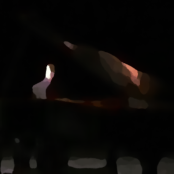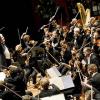Search the Community
Showing results for tags 'modern'.
-
Hello, all. This is a piece I've been working on for a while for string quintet -- two violins, viola, cello, and double bass (the resources I have) -- and I hope for this to be a multi-movement piece in the future once I have more time to write. This is a quick jig that introduces material that I hope to carry over into other movements. Let me know what you guys think!
-
Hey guys. I've made this peice and seem to be making a lot like this these day. Does anyone know other dudes who sound like me? Or have any feedback for me? I'm kinda in the dark hear. Any thoughts would be much appreciated. Thanks
-
I'd like to encourage EVERYONE on here to take a listen to a 24/7 radio station dedicated to promoting works by living composers. Many of the works programmed so far have not had any real performance outside of their premiere. One work, that I know of, hadn't even had a premiere -the broadcast turned out to be its world premiere! The radio station can be viewed here: http://etlux.playtheradio.com We also have a companion website, still in development, that features a program of the works played, program notes for selected works, composer bios, and a forum to connect musicians with featured composers with the goal of generating future performance and commission opportunities. The website can be viewed here: https://etluxradio.playtheradio.com ALSO: I am sponsoring a YCM Forum Competition seeking radio jingles. The deadline is September 15! Get those Jingles written!!
-
This is just a trifle really. Started these about 2 months ago. The idea is a brief prelude written every morning. The first one plays around with a serial matrix -purposefully breaking the means at which the matrix is used to generate the material for a piece. The second one follows this same purposeful inconsideration of serial technique by juxtaposing the material from the matrix in a particular manner. Again, these two are mere trifles -serious pieces, but really just trifles. Note, I'm just learning musescore. I don't know the full ins and outs of making the scores look professional -so don't bother critiquing that!
-
Hello, This is my lattest piano work, composed in january. I wanted write an animated piece, inspired by popular music of Portugal, so it is very tonal probably one of the most tonal pieces I made. I would apreciate very much your feedback and I apologise for the lack of dynamics Thank you!
-
Hello, I would like to share with you a short piece I composed about the train stations in my country. The first measure right hand is the melody used in the station to alert people that a train is arriving, so that's why it's about a train station I would aprecciate very much your feedback, dont stick too much with the "train station" theme, it's just to give a title to the music!
-
Hello, I would like to share with you a short piano piece I did some time ago. In this work I tried to write with some classical construction with my own ideas, which makes it a not serious piece. I would apreciate some feedback Thank you!
-
Hello everyone, This is my very first post here on youngcompers. I would like to have your feedback on one of my latest music "broken" which is a very, very short instumental music. This piece is part of my new project called "Non-sense" where I try to push music to the absurd and unbearable levels, but still maintain a musical structure. I hope you like it! For more pieces like this visit my blog : http://antimusicale.blogspot.pt/
-
Prelúdio e Fuga (SAT).mp3 This is a Prelude and Fugue for recorder trio (soprano, alto and tenor). I composed it for a trio (which was a quartet, but one person gave up) I would take part in, but then the whole group "ceased to exist" without a single rehearsal with everybody (= 3 people). The Prelude and Fugue continues to existe, but now without a concrete destiny. Hope you enjoy^^ OBS: I changed the VST to flutes because Garritan's recorder sound is a scream of pain from hell. OBS2: I didn't put dynamics, articulations or anything else because I'm lazy.
-
So, I'm reposting old stuff because they're somehow gone. This is one of them. Enjoy^^
-
Blissful Morning (Opus 15, classical version) written for piano, flute, violoncello, and a little dose of synthesizer in the finale. Originally, I planned on adding a toy piano sound, but unfortunately my software (Logic Pro X) doesn't have one. Instead of that, one of the syntheiszer leads has been added. The piece is written in F major entirely. I was trying to not jump too much in the rhythm sections or harmony, since my music teacher advised me to try to stick to one idea - sometimes less is more, and ideal doesn't mean perfect. If you like this version, please check out the electro one available on this site too! Thank you for listening, any helpful hints and comments!
-
EXHALE is a playable vocal engine built for producers, composers, artists and sound designers. It's the First Truly Modern Vocal Engine. We spent thousands of hours and worked with top producers and engineers to sample vocalists and full choirs. Then we spent 6 months with Sound Designers manipulating the raw performances with vintage gear, analog gear, vocoders, tape machines, and anything else we could get to mess it up in a good way. Exhale's Ground Breaking Engine features Tempo syncing fx, stutters, delays, pads, loops, saturation, macros, motion, flux and more. - 500 Unique Presets - 3 modes: Notes, Loops & Slices - 10 GB raw material - Custom FX Presets - Custom Macros Per Preset - NKS Support - Snapshots for Maschine - Macro Editing - Main and Engine Pages - Automatable Insert and Mod FX http://output.com/
-
- modern
- vocal engine
-
(and 2 more)
Tagged with:
-
I'm sure this can't just be me personally. I've noticed, no matter what kind of music from what style or era, the stuff that challenges me the most, that causes me perhaps the most confusion or perplexity at first listen is the same stuff that, when given serious attention to, also becomes the stuff I tend to love the most. For not classical music, the biggest example of this that I can think of is Joanna Newsom, starting with her album Ys. There are only five tracks on the album, and really each one of them is splendidly wonderful. A good example of her style, and one I especially love, would be the second track. A friend first introduced this to me a long time ago, and I was appalled. But at his encouragement to give it a chance, I listened repeatedly, and it clicked, and this album of hers (as well as her three-CD release after it, Have one on Me) hold their places among the small handful of 'modern' or 'pop' or just non-classical music that I hold dear to my heart. Classically speaking, a few examples would be the late piano sonatas of Alexander Scriabin. Early in my more studious listening efforts, when I decided it was time to start listening to stuff other than Chopin or Schumann, even Scriabin's earlier work seemed strange, but again... after repeated listenings, I really came to love them. They don't seem so... outrageous now. My favorites are probably the eighth and the ninth. The same was kind of the case with Mahler, not because of tonality, but his works present their own challenges. The length of his symphonies alone can be daunting. Anyway, I adore them. Perhaps the greatest contrast between first reaction to current feelings toward the work is probably Schoenberg's piano concerto. The first time I listened to it, I didn't. I mean, I got through maybe the first few minutes before I had had enough. And now I feel it is a stunningly beautiful work, perhaps one I'd choose to hear live over Rachmaninoff, Beethoven, Brahms, anything else. It's remarkable. I want to say, though, that even if I was repulsed by some of these pieces at first listen (and I wouldn't use such an extreme word to describe my initial response), I still feel there was something that clicked, an inkling that at least told me to keep trying with the piece, but that could just be a biased opinion based on my current feelings toward them. I have not been inclined to give Boulez's Le Marteau or Berio's Sinfonia or Schnittke's first symphony second listens, for example. Boulez's piano sonatas still intrigue me, and I've gone back to listen to them a number of times, but my latest fascination has been Milton Babbitt, more specifically his second and sixth string quartets, Composition for Four Instruments, clarinet quintet, and Three Compositions for Piano. I am finding it to be really wonderful to get to know these pieces better. What about you? What are your hate-then-love pieces? What was the process like? (I have mainly discussed more modern works, but there's no reason why someone wouldn't have issues coming to love Mozart or Beethoven or Bach if their tastes lie more in complicated modern works. Perhaps the challenge is the lack of challenge, the straightforwardness, whatever. I'm only now really getting into the classical era and starting to find it more beautiful than bland).
- 15 replies
-
- repertoire
- taste
- (and 4 more)
-
I open this question up to you purely out of impulse and interest.
- 16 replies
-
- modernism
- expression
-
(and 7 more)
Tagged with:
-
What I am getting at is that nowadays too often originality comes at the cost of intellectual coherence and greatness. Originality becomes only due to novel sounds and effects. This kind of originality would be something that, for example a deaf Beethoven would not value, let alone pursue. So, is the kind of intellectual greatness that is distinctive of a Bach partita for solo violin/cello, or a Beethoven quartet, or a Mozart quintet for example, still possible and attainable in composition today without the sacrifice of any originality, where the originality would not be superficial (as in mere sound) but in intellectual depth and style, in pure musical greatness of the inward kind?
- 23 replies
-
This is a thought that has nagged at me for years now, ever since I started to compose. Let me make it clear, I am not referring to what forms are available on a larger scale (e.g. Concerto, Sting Quartet and so on), nor do I mean how do we handle and develop our themes and ideas – all be this closer to what I mean. I am referring specifically to our use of form and its originality. For example if I say ‘Sonata form’ or ‘Scherzo’, immediately one conjures up a preconception of an inner form – a ‘middle-ground’ form perhaps, if we were to borrow a term from Schenker. Taking a sonata for example, the inner form using the most basic model would be: Exposition (AB-codetta), Development (A’B’), and Recapitulation (AB-coda). However, such middle-ground structures and their subsequent tonal implications seem unsatisfactory in contemporary composition. So, how on this level should we structure music? Obviously some forms are tied to their preconceptions more so than others, the Scherzo for example is little more than a name nowadays rather than form set in stone. On the other hand the sonata despite its many permutations is still a sonata; it is still tied to the concepts of exposition, development, and recapitulation no matter how blurred the boundaries are. Staying strictly within the realms of ‘absolute music’, – i.e. music with no extra-musical connotations such as the tone poem, or other music in which a narrative governs its structure – if the sonata as a form is redundant in 21st century what do we replace it with? As soon as we say this, a whole world of possible alternatives to the sonata opens up. Unfortunately many, (though for different reasons) seem equally unsatisfactory as the sonata. For example, opening a concerto with a (strict) fugue would probably be unsustainable. Using an essentially made up form e.g. ABABACDEBA, lacks the academic rigour required in contemporary composition – at least in this ‘middle-ground’. We could develop forms based upon mathematical principals such as the Golden Ratio, but this is more of an overall form (like the scherzo) and so would leave questions regarding thematic coherence relative to the structure. In short I am at a loss, any suggestions? J
-
Greetings to all fellow composers! For some bizarre and peculiar reason, we are living in an age where people are becoming obsessed with thinking that we have to label every single compositional style that composers write in. I was reading a book by the australian composer Andrew Ford (it was called "Illegal Harmonies") about modern music since 1900 and I was amazed to see that the glossary of musical styles (Impressionism, futurism etc.) went on for about 50 pages! I don't really see the need to label music in this way as the words hardly help anyone just listen to the music and the sounds created.In my opinion, all of these words that we apply to different styles of modern classical music are absolutely meaningless. To show you what I mean I'll use the labels "Impressionism" and "minimalism" as examples. Impressionism is a word used when describing the style of painting that was around in France in the late 1800s and early 1900s. This style was influenced by the effect that light had on certain objects and places; often artists would paint the same object/landscape with different lightings to create very different images (Monet has done some good examples of this). Now, what musicologists and whatever have done with this word is this: they have used it to describe the music by the French composers Debussy, Ravel, Satie and several others. The thing that doesn't make sense is that in order to make the music go with this label means that he music has to take the features of impressionist painting (the effect of light on objects and places) and apply them to the music (which would therefore sound completely different). Even thought Debussy has written music that happens to have titles that you would imagine you'd find on a painting by Monet (e.g 'The Sunken Cathedral') it techincally is NOT genuine impressionism. In the long run, Debussy hated the term anyway. Minimalism is a term that is used to describe the fine arts that has very little or no diversity when it comes to the art elements (colour, shape, form, tone, line, space and texture). Musicologists have taken this word and stupidly applied it to the music of composers such as Philip Glass and John Adams. A lot of the works by these so called "minimalist" composers are bursting with colour and harmonies that you would not expect from an artist like Carl Andre. The only thing that someone would say that is "minimal" about their music is the lack of motific development. If I let a six-year-old listen to the first movement of Glass' first violin concerto or Adams' "A Short Ride In A Fast Machine" and asked them to describe the music they just heard, the word "minimal" would pretty much definitely not occur. In the long run, Glass and Adams (just like Debussy with "impressionism") they hated the term anyway.
-
I am enamored with the chorale. I love Bach's settings of the Lutheran hymns, I love 19th-century/early 20th century French chorale writing, I love that particular, simple, directly emotional quality. It is for this reason that I am fascinated by the use of chorale-like writing in modern music: for me, it serves as a way to return the long-breathed line so common in the common-pratice era to the often pointillistic, agitato music I am in the habit of writing. What, if any, is its significance to others? In addition, post some of your favorite usages of chorale-like textures in modern music. Mine: Donatoni's Poll, for chamber ensemble: Donatoni was in the habit of writing small, rudimentary gestures that relentlessly continue and eventually form the skeleton of a work, much like the short, staccato scalar figures here. But around :59, he interrupts everything - only briefly - with a craggy, limping chorale that I think is incredibly gorgeous.Bartók's Piano Concerto No. 2, Movement II: http://www.youtube.c...feature=related Stacked fifths in the strings, most beautiful thing ever.











